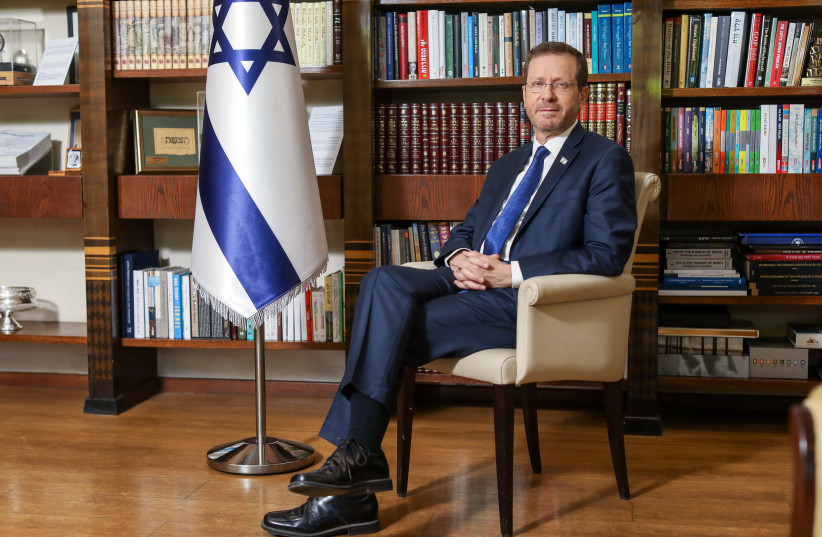Naale program bringing Diaspora teenagers to Israel celebrates 30 years

Naale, which is an outgrowth of Nativ, has brought 20,000 teenagers to Israel since its inception.
Naale, the ambitious educational program that brings Diaspora youth to Israel for no-strings-attached free high school studies, on Tuesday celebrated its 30th anniversary at the President’s Residence in Jerusalem.
Naale, which is an outgrowth of Nativ, an administrative unit within the Prime Minister’s Office, has brought 20,000 teenagers to Israel since its inception. Of these, 90% chose to stay, served in the army and in many cases, later distinguished themselves in their various careers. More than half were subsequently joined by their families.
The Nativ unit was founded as a means of creating a bridge between Israel and Jews in the former Soviet Union. It was established at the initiative of then prime minister Yitzhak Shamir. As a further step, long-term education minister Zevulun Hammer proposed bringing teenage youth from the FSU to Israel free of charge to study in boarding schools around the country on scholarships provided by the Education Ministry.
He also gave the project its name – Naale. Meaning, We will go up.
Other partners were the Jewish Agency and the Aliyah and Integration Ministry.
Yeshayahu Yechieli, the founding program director of the project, who is still at the helm, noted on Sunday, that it is a Jewish tradition to save Jewish children and educate them since they are the decision makers of the future. He cited Rabbi Isaac Halevy Herzog, who immediately after the conclusion of the Second World War, went to Europe to find child Holocaust survivors and bring them to the Land of Israel. Yechieli also cited the Lubavitcher Rebbe Menachem Mendel Schneerson, who sent emissaries throughout the Soviet Union to find Jews and to restore their spiritual heritage.
Thirdly, he mentioned Rabbi Haim Druckman, who died last month. Knowing that many of the children from the FSU were not Jewish according to Halacha, Druckman made provisions for their studies in Judaism and their conversion.
Yechieli was proud of the fact that at last year’s Israel Independence Day celebrations, seven of the 120 young men and women named as outstanding soldiers, were graduates of Naale.
During the past year, a new cohort of 350 students from war-torn Ukraine were brought to Israel and placed in Naale schools. Among them was Renet Meisarov, a 16-year-old youngster who came with his family after being processed by the Jewish Agency. En route, the family heard about Naale. He applied, was accepted and said that he now has a second home and that he is very happy. Speaking in Hebrew, he said he is pleased to have the opportunity to study music which is his great love.
ALSO PRESENT among the many alumni, past and present teachers, government ministers and members of Knesset, was Igor Mozes, who had come from Moscow with the first cohort, 31 years ago. He had been sent to Kfar Hayarok, and after completing high school had joined the IDF's Nahal unit where he served for 15 years. Following his discharge, he studied education, and the first job he had symbolized the closing of a circle. He was sent to Kfar Hayarok, to take charge of a group of new Naale students. Today, he is the principal of the school at Kfar Hayarok.
Aliyah: A unique Hebrew word for homecoming, not migrating
President Isaac Herzog commented that there are certain unique words in the Hebrew language such as aliyah which is used rather than hagira, which is the Hebrew word for migration. But aliyah, which means going up, is not a matter of migrating from place to place, but a homecoming.
Naale is a success story, he said, in that it symbolizes the Zionist vision – which is aliyah.
In his various capacities as legislator, minister and Jewish Agency chairman, Herzog had met Naale youth who had left their homes and their countries and had come alone to Israel to make changes in their lives, said Herzog, who praised the partnership between the Education Ministry, the Jewish Agency and the Aliyah and Integration Ministry.
Newly appointed Education Minister Yoav Kisch said that this was one of his first public speeches in his present role and that he was very glad that it related to this particular project. Stressing the importance of a continuing connection between Israel and Diaspora Jewry, Kisch remarked on the expansion of the project to include youth beyond the FSU. Jewish youth from 80 countries have come to Israel via Naale, he said.
He was full of admiration for youth who had taken the plunge without knowing exactly what awaited them.
Ofir Sofer, the aliyah and integration minister, characterized Naale as a project that tells the story of the Jewish people. There is no more painful separation than that of a child from his parents, he said. Naale succeeded, he declared because parents allowed their children to leave home and come to Israel.
As aliyah and integration minister, he added that he saw great importance in bringing young people to the country.
Jewish Agency chairman Doron Almog pointed out that Naale is continuing a tradition. Israel’s founding prime minister David Ben-Gurion and second president Yitzhak Ben-Zvi were in their early 20s when they first arrived in the country. It was important for them to come then, he said, and it is no less important for young people to come now because they are the ones who will influence the future.
Together with the two ministers he pledged to continue the partnership to make Naale stronger than ever.
Jerusalem Post Store
`; document.getElementById("linkPremium").innerHTML = cont; var divWithLink = document.getElementById("premium-link"); if (divWithLink !== null && divWithLink !== 'undefined') { divWithLink.style.border = "solid 1px #cb0f3e"; divWithLink.style.textAlign = "center"; divWithLink.style.marginBottom = "15px"; divWithLink.style.marginTop = "15px"; divWithLink.style.width = "100%"; divWithLink.style.backgroundColor = "#122952"; divWithLink.style.color = "#ffffff"; divWithLink.style.lineHeight = "1.5"; } } (function (v, i) { });

